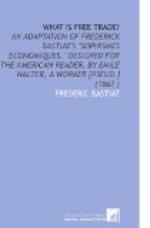Working men, your situation is singular! You are robbed, as I will presently prove to you. But no: I retract the word; we must avoid an expression which is violent; perhaps, indeed, incorrect; inasmuch as this spoliation, wrapped in the sophisms which disguise it, is practised, we must believe, without the intention of the spoiler, and with the consent of the spoiled. But it is nevertheless true that you are deprived of the just remuneration of your labor, while no one thinks of causing justice to be rendered to you. If you could be consoled by the noisy appeals of your champions to philanthropy, to powerless charity, to degrading almsgiving, or if the high-sounding words of Voice of the People, Rights of Labor, &c., would relieve you—these indeed you can have in abundance. But justice, simple justice—this nobody thinks of rendering you. For would it not be just that after a long day’s labor, when you have received your wages, you should be permitted to exchange them for the largest possible sum of comforts you can obtain voluntarily from any man upon the face of the earth?
I too, perhaps, may some day speak to you of the Voice of the People, the Rights of Labor, &c., and may perhaps be able to show you what you have to expect from the chimeras by which you allow yourselves to be led astray.
In the meantime let us examine if injustice is not done to you by the legislative limitation of the number of persons from whom you are allowed to buy those things which you need; as iron, coal, cotton and woollen cloths, &c.; thus artificially fixing (so to express myself) the price which these articles must bear.
Is it true that protection, which avowedly raises prices, and thus injures you, proportionably raises the rate of wages?
On what does the rate of wages depend?
One of your own class has energetically said: “When two workmen run after a boss, wages fall; when two bosses run after a workman, wages rise.”
Allow me, in similar laconic phrase, to employ a more scientific, though perhaps a less striking expression: “The rate of wages depends upon the proportion which the supply of labor bears to the demand.”
On what depends the demand for labor?
On the quantity of disposable capital seeking investment. And the law which says, “Such or such an article shall be limited to home production and no longer imported from foreign countries,” can it in any degree increase this capital? Not in the least. This law may withdraw it from one course, and transfer it to another; but cannot increase it one penny. Then it cannot increase the demand for labor.
While we point with pride to some prosperous manufacture, can we answer, whence comes the capital with which it is founded and maintained? Has it fallen from the moon? or rather is it not drawn either from agriculture, or stock-breeding, or commerce? We here see why, since the reign of protective tariffs, if we see more workmen in our mines and our manufacturing towns, we find also fewer vessels in our ports, fewer graziers and fewer laborers in our fields and upon our hill-sides.




